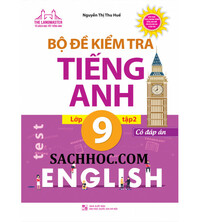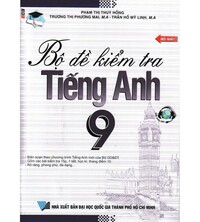Writing - Unit 9. World Englishes - SBT Tiếng Anh 9 Global Success
1. Choose the correct sentence A, B, C, or D which best combines each pair of sentences. 2. Make sentences using the words and phrases below. You can make changes to the words and phrases, and add more words if necessary.
Bài 1
1. Choose the correct sentence A, B, C, or D which best combines each pair of sentences.
(Chọn câu đúng A, B, C hoặc D mà là câu kết hợp tốt nhất mỗi cặp câu.)
1. Singapore is a multilingual country. It has four official languages.
A. Singapore is a multilingual country which have four official languages.
B. Singapore is a multilingual country has four official languages.
C. Singapore is a multilingual country which has four official languages.
D. Singapore is a multilingual country have four official languages.
2. It is an Expanding Circle country. Its people speak English as a foreign language.
A. It is an Expanding Circle country whose people speak English as a foreign language.
B. It is an Expanding Circle country which people speak English as a foreign language.
C. It is an Expanding Circle country who speak English as a foreign language.
D. It is an Expanding Circle country whose people speaks English as a foreign language.
3. Vietnamese people use English to communicate with foreigners. Foreigners come to Viet Nam to work, study, or visit.
A. Vietnamese people use English to communicate with foreigners they come to Viet Nam to work, study, or visit.
B. Vietnamese people use English to communicate with foreigners come to Viet Nam to work, study, or visit.
C. Vietnamese people use English to communicate with foreigners which come to Viet Nam to work, study, or visit.
D. Vietnamese people use English to communicate with foreigners who come to Viet Nam to work, study, or visit.
4. English is now the most popular language. A lot of people learn it.
A. English is now the most popular language a lot of people learn it.
B. English is now the most popular language a lot of people learn.
C. English is now the most popular language which a lot of people learn it.
D. English is now the most popular language which lot of people learn.
5. English is a compulsory subject from Grade 3 to Grade 12. Most Vietnamese schools teach it.
A. English is a compulsory subject from Grade 3 to Grade 12 most Vietnamese schools teach it.
B. English is a compulsory subject from Grade 3 to Grade 12 which most Vietnamese schools teach it.
C. English is a compulsory subject from Grade 3 to Grade 12 which most Vietnamese schools teaching.
D. English is a compulsory subject from Grade 3 to Grade 12 which most Vietnamese schools teach.
Lời giải chi tiết:
|
1. C |
2. A |
3. D |
4. B |
5. D |
1. C
Danh từ “a multilingual country” – một quốc gia đa ngôn ngữ => danh từ chỉ vật
which + V: thứ mà (thay thế cho danh từ chỉ vật, đóng vai trò làm chủ ngữ)
Singapore is a multilingual country. It has four official languages.
(Singapore là một quốc gia đa ngôn ngữ. Nó có bốn ngôn ngữ chính thức.)
A. sai ngữ pháp: “have” => “has”
B. sai ngữ pháp: thiếu “which” sau “country”
C. Singapore là một quốc gia đa ngôn ngữ nơi có bốn ngôn ngữ chính thức.
D. sai ngữ pháp: thiếu “which” sau “country”, “have” => “has”
Chọn C
2. A
Dùng đại từ quan hệ “whose” thay thế cho tính từ sở hữu “its”
It is an Expanding Circle country. Its people speak English as a foreign language.
(Đây là một quốc gia Vòng tròn mở rộng. Người dân ở đây nói tiếng Anh như một ngoại ngữ.)
A. Đây là một quốc gia Vòng tròn mở rộng mà người dân nơi đây nói tiếng Anh như một ngoại ngữ.
B. sai ngữ pháp: “which” => “whose”
C. sai ngữ pháp: “who” => “whose people”
D. sai ngữ pháp: “speaks” => “speak”
Chọn A
3. D
Danh từ “foreigners” – những người nước ngoài => danh từ chỉ người
who + V: người mà (thay thế cho danh từ chỉ người, đóng vai trò làm chủ ngữ)
Vietnamese people use English to communicate with foreigners. Foreigners come to Viet Nam to work, study, or visit.
(Người Việt sử dụng tiếng Anh để giao tiếp với người nước ngoài. Người nước ngoài đến Việt Nam làm việc, học tập hoặc tham quan.)
A. sai ngữ pháp: “they” => “who”
B. sai ngữ pháp: thiếu “who” sau “foreigners”
C. sai ngữ pháp: “which” => “who”
D. Người Việt sử dụng tiếng Anh để giao tiếp với người nước ngoài đến Việt Nam làm việc, học tập hoặc tham quan.
Chọn D
4. B
Danh từ “the most popular language” – ngôn ngữ phổ biến nhất => danh từ chỉ vật
which + S + V: thứ mà (thay thế cho danh từ chỉ vật, đóng vai trò làm tân ngữ) => có thể lược bỏ khi đóng vai trò làm tân ngữ
English is now the most popular language. A lot of people learn it.
(Tiếng Anh hiện nay là ngôn ngữ phổ biến nhất. Rất nhiều người học nó.)
A. sai ngữ pháp: bỏ “it”
B. Tiếng Anh hiện nay là ngôn ngữ phổ biến nhất được rất nhiều người học.
C. sai ngữ pháp: bỏ “it”
D. sai ngữ pháp: thiếu “a” trước “lot of”
Chọn B
5. D
Danh từ “a compulsory subject from Grade 3 to Grade 12” – môn học bắt buộc từ lớp 3 đến lớp 12=> danh từ chỉ vật
which + S + V: thứ mà (thay thế cho danh từ chỉ vật, đóng vai trò làm tân ngữ) => có thể lược bỏ khi đóng vai trò làm tân ngữ
English is a compulsory subject from Grade 3 to Grade 12. Most Vietnamese schools teach it.
(Tiếng Anh là môn học bắt buộc từ lớp 3 đến lớp 12. Hầu hết các trường học ở Việt Nam đều dạy môn này.)
A. sai ngữ pháp: bỏ “it”
B. sai ngữ pháp: bỏ “it”
C. sai ngữ pháp: “teaching” => “teach”
D. Tiếng Anh là môn học bắt buộc từ lớp 3 đến lớp 12 mà hầu hết các trường học ở Việt Nam đều giảng dạy.
Chọn D
Bài 2
2. Make sentences using the words and phrases below. You can make changes to the words and phrases, and add more words if necessary.
(Đặt câu sử dụng các từ và cụm từ dưới đây. Bạn có thể thay đổi các từ và cụm từ cũng như thêm nhiều từ hơn nếu cần.)
1. Singapore / multilingual country / and / many people / speak / three or four language / .
2. Most children / become / bilingual / from / early age / and / learn / more / language / as they grow / .
3. The presence / different languages / have affected / English of Singapore / .
4. Singlish / kind of / English / which is used / informally / this country / .
5. Singaporean children / tend / speak / Singlish / before / speak / standard English / .
Lời giải chi tiết:
1.
Thì hiện tại đơn diễn tả sự thật hiển nhiên => cấu trúc: S + V_(s/es)
Singapore is a multilingual country and many people speak three or four languages there.
(Singapore là một quốc gia đa ngôn ngữ và nhiều người ở đó nói được ba hoặc bốn thứ tiếng.)
2.
Thì hiện tại đơn diễn tả sự thật hiển nhiên => cấu trúc: S + V_(s/es)
Most children become bilingual from an early age and learn more languages as they grow.
(Hầu hết trẻ em trở thành người học song ngữ ngay từ khi còn nhỏ và học thêm nhiều ngôn ngữ hơn khi chúng lớn lên.)
3.
Thì hiện tại hoàn thành: S + have/ has + P2
The presence of different languages has affected the English of Singapore.
(Sự hiện diện của các ngôn ngữ khác nhau đã ảnh hưởng đến tiếng Anh của Singapore.)
4.
Thì hiện tại đơn diễn tả sự thật hiển nhiên => cấu trúc: S + am/ is/ are + danh từ/ tính từ/ …
Singlish is a kind of English which is used informally in this country.
(Singlish là một loại tiếng Anh được sử dụng không chính thức ở đất nước này.)
5.
Thì hiện tại đơn diễn tả sự thật hiển nhiên => cấu trúc: S + V_(s/es)
Singaporean children tend to speak Singlish before they speak standard English.
(Trẻ em Singapore có xu hướng nói tiếng Singlish trước khi nói được tiếng Anh chuẩn.)
Bài 3
3. You received an email from Nhi, your penfriend in Ho Chi Minh City. She asks you to write her about the reasons why you learn English. Now write an email (about 120 words) to tell her.
(Bạn nhận được email từ Nhi, bạn qua thư của bạn ở Thành phố Hồ Chí Minh. Cô ấy hỏi bạn viết cho cô ấy về lý do tại sao bạn học tiếng Anh. Bây giờ hãy viết một email (khoảng 120 từ) để nói với cô ấy.)
From: _____ (your email address)
Subject: My reasons for learning English
Dear Nhi,
I’m happy to have received your email. I’m going to share with you why I learn English.
_____________________________________________________________________________________
_____________________________________________________________________________________
_____________________________________________________________________________________
That’s all for now, Nhi. What about you? Why do you learn English?
Cheers,
______
Lời giải chi tiết:
From: [email protected]
Subject: My reasons for learning English
Dear Nhi,
I’m happy to have received your email. I’m going to share with you why I learn English.
One of the main reasons I learn English is because it’s the primary language of international communication. Knowing English opens up opportunities to connect with people from different cultures and countries. It also enhances my career prospects, as many multinational companies require English proficiency. Moreover, English gives me access to a vast amount of information, from books to online resources, which are predominantly in English.
That’s all for now, Nhi. What about you? Why do you learn English?
Cheers,
Hoa
Tạm dịch thư điện tử:
Gửi: [email protected]
Chủ đề: Lý do học tiếng Anh của tôi
Nhi thân mến,
Tôi rất vui khi nhận được email của bạn. Tôi sẽ chia sẻ với bạn lý do tại sao tôi học tiếng Anh.
Một trong những lý do chính khiến tôi học tiếng Anh là vì đây là ngôn ngữ chính trong giao tiếp quốc tế. Biết tiếng Anh mở ra cơ hội kết nối với mọi người đến từ các nền văn hóa và quốc gia khác nhau. Nó cũng nâng cao triển vọng nghề nghiệp của tôi vì nhiều công ty đa quốc gia yêu cầu trình độ tiếng Anh. Hơn nữa, tiếng Anh cho phép tôi tiếp cận với lượng thông tin khổng lồ, từ sách đến các nguồn tài nguyên trực tuyến, chủ yếu bằng tiếng Anh.
Hiện tại chỉ vậy thôi Nhi. Còn bạn thì sao? Tại sao bạn lại học tiếng Anh?
Tạm biệt,
Hoa
Search google: "từ khóa + timdapan.com" Ví dụ: "Writing - Unit 9. World Englishes - SBT Tiếng Anh 9 Global Success timdapan.com"







